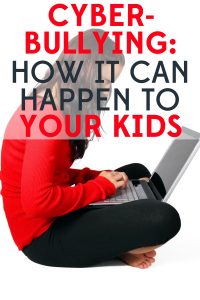
Bullies aren’t just on the playground anymore, they’re online. It’s easy for people to lash out from the privacy from their keyboards in a way that they would never do face-to-face with another person. According to the website NoBullying.com, 25 percent of teenagers report that they have experienced repeated bullying via their cell phone or on the internet and more than half of young people surveyed say that they never confide in their parents when cyberbullying happens to them. If your kids have a smartphone, computer, iPad or other device, they may become the victim of cyberbullying, as mine did.
This is how my kids were cyberbullied.
My son was the victim of a hacker. We’ve all had the friend whose email was hacked and suddenly we get a panicked email saying they’re stuck in some foreign country without a passport and need a large amount of money wired to them immediately. Our friend sends out a mass email apologizing for the hack and warns everyone not to send any money. Well, there are other kinds of hackers, too. On Instagram, someone found a way to make it look as if users are going around tagging people as “The Ugliest Girl on Instagram.” My 14 year-old son was in a theater program this summer, and on the last day, which was meant to be a jubilant celebration, a mother came up to my husband and started verbally assaulting him saying our son had tagged her daughter as being “The Ugliest Girl on Instagram.” I asked my son if he did this and he was adamant that he did not. He has autism and it is difficult for those on the autism spectrum to lie. He told me that he had been tagged as “The Ugliest Boy” on Instagram and his sister had been tagged, too, so clearly, this was some kind of stupid online prank. Lesson: Kids pull pranks. If your kid suspects a friend did something mean, confront that person before assuming it’s true.
My 11 year-old daughter lost her best friend after someone spread lies about her in a chat room. All summer long, my daughter’s best friend has been avoiding my daughter, not accepting requests to come over and play or swim in our pool. I finally texted the mother to find out what was going on. It turns out that a third girl went into a chat room and publicly told my daughter’s friend – and anyone else who cared to listen – that my daughter was trying to hack her online gaming account by using her password. Which she doesn’t even know. I had a talk with my daughter and desperately tried to clear the air with the friend’s mother, but the damage was done. An entire friendship was thrown away, a summer of fun together lost, all over lies spread in an online chatroom. Lesson: Kids, get off the device and talk to your friends on the phone. Emails, texts and communication on websites are not the same as talking things out.
People left comments on my son’s YouTube channel that he should kill himself. Kids can be mean. The cruelest post came from a girl – proof that bullies come in all forms. My son’s channel is a daily vlog of his day. What he did in art class, what he did in his theater program, what movie he saw, etc. It is not controversial in any way. I don’t think the people who have posted mean comments are aware that he has autism, but it shouldn’t matter – no one should leave the KYS comment (“Kill Yourself”) on anyone’s channel. Recently, however, two popular YouTubers, LeafyIsHere and keenstar were called out for cyberbullying another YouTuber, TommyNC2010, because he has autism. And yes, their videos are still available to watch on YouTube. Not wanting my son to experience the same kind of attacks, I spoke to him about making his account private. However, he wants to reach people, so he doesn’t want to do that and he doesn’t want to turn off the comments. He does know how to block people from posting again and has done that. YouTube provides information on reporting harassment and cyberbullying. Lesson: Unfortunately, if you are a wannabe YouTube star, that often comes with Haters. Do your best to block them out. Don’t let the bullies win.
What can you, as a parent, do? Keep clear lines of communication between yourself and your kids. Let them know you are there for them and that they can talk to you if they’re being bullied online. Also talk to them about the power of their own angry or hurtful words typed online.
What can be done to prevent cyberbullying (via NoBullying.com):
- Encourage kids to report incidents of cyberbullying to an adult, but be careful to reassure victims they will not be punished.
- Reassure the bullying victim that they are not at fault for these attacks against them.
- Encourage adolescents and teens to save cyberbullying messages as proof that the cyberbullying is occurring. This is especially important if the incidents are eventually reported to the police, to parents or school officials or to the bully’s cellular provider.
- Since much of the cyberbullying attacks happen via cell phones, victims should start by changing their cell phone number and/or email addresses. You can also contact your cell phone provider to block the bully from contact.
- Cyberbullying statistics indicate that many instances involve the bully impersonating someone else. Therefore, encourage young people not to send information or photos via text or instant messaging they wouldn’t want shared publicly.



If you discover that your child is being cyberbullied, offer comfort and support. Talking about any bullying experiences you had in your childhood might help your child feel less alone.